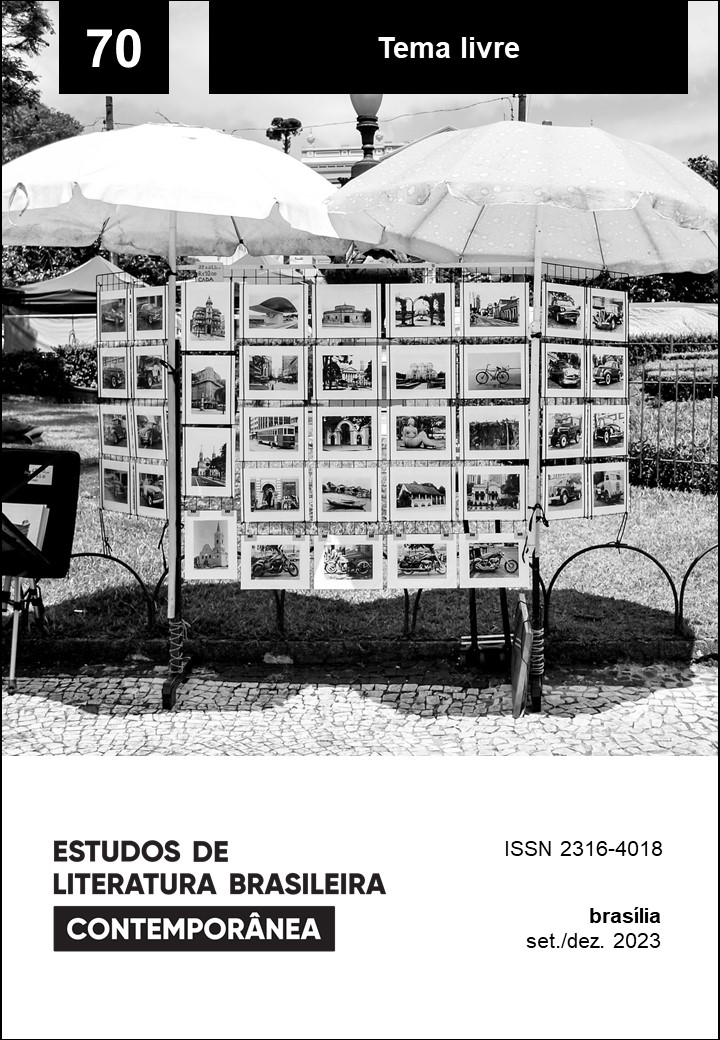Revisiting ourselves: the paths of ancestrality and temporality in the construction of an afrofuturist literature
DOI:
https://doi.org/10.1590/2316-40187004Keywords:
afrofuturist literature; temporality; ancestry; empowerment; Lu Ain-ZailaAbstract
The writer Luciene Marcelino Ernesto, known as Lu Ain-Zaila is, along with Fábio Kabral, a precursor of Afrofuturist literature in Brazil. Their narratives are based on science fiction, mythology, and fantasy, intertwining them with the lives of the black population in the Brazilian urban context. Afrofuturism is a concept, a literary, cultural, aesthetic, and political movement that arises from the encounter between technology and speculative fiction, having conceived the possibility of a black future. This movement proposes to redirect our gaze to History from an Afrocentric perspective, where black men and women are protagonists of their narratives, expressions, manifestations. This article brought an analysis on the short story “Ode à Laudelina”, from the book Sankofia: brief stories about Afrofuturism (Ernesto, 2018). This short story deals with the universe of maids, showing how this workforce was exploited as a result of a slave-owning society which sought to maintain this logic even today. However, these women, with knowledge and access to their rights, are able to break free from the shackles of this work that sought to alienate them. Furthermore, the story of black women empowerment is also highlighted, which is effected through the aesthetic presentation of the characters. Such approaches can be seen from the perspective of Afrofuturism, since such a movement transits between the past, present, and future, dialoguing with the idea of ancestry, which is demonstrated in the short story.
Downloads
References
BENTO, Maria Aparecida Silva; CARONE, Iray (2002). Branqueamento e branquitude no Brasil. In: CARONE, Iray; BENTO, Maria Aparecida Silva (org.). Psicologia social do racismo: estudos sobre branquitude e branqueamento no Brasil. Petrópolis: Vozes, p. 25-58.
BERTH, Joice (2019). Empoderamento São Paulo: Pólen.
CARDOSO, Lourenço (2010). Branquitude acrítica e crítica: A supremacia racial e o branco anti-racista. Revista Latinoamericana de Ciencias Sociales, Niñez y Juventud, v. 8, n. 1, p. 607-630.
DERY, Mark (1994). Black to the future: interviews with Samuel R. Delany, Greg Tate and Tricia Rose. In: DERY, Mark. Flame Wars: the discourse of cyberculture. Durham: Duke University Press.
ERNESTO, Luciene Marcelino (2018). Sankofia: breves histórias sobre afrofuturismo. Rio de Janeiro: Edição do Autor.
GOMES, Nilma Lino (2008). Sem perder a raiz: corpo e cabelo como símbolos da identidade negra. Belo Horizonte: Autêntica.
GRAHAM, Sandra Lauderdale (1992). Proteção e obediência: criadas e seus patrões no Rio de Janeiro – 1860–1910. São Paulo: Comapnhia das Letras.
HOOKS, bell (2014). Alisando o nosso cabelo. Tradução de Lia Maria dos Santos. Geledés Disponível em: https://www.geledes.org.br/alisando-o-nosso-cabelo-por-bell-hooks/ Acesso em: 10 out. 2022.
» https://www.geledes.org.br/alisando-o-nosso-cabelo-por-bell-hooks/
MERCER, Kobena (1987). Black hair/Style politics. New Formations, v. 1987, n. 3, p. 33-54.
MUNANGA, Kabenguele. (2017). As ambiguidades do racismo à brasileira. In: KON, Noemi M.; SILVA, Maria L.; ABUD, Cristiane C. (org.). O racismo e o negro no Brasil: questões para a psicanálise. São Paulo: Perspectiva, 2017. p. 71-90.
NOA, Francisco (2015). Império, Mito e Miopia: Moçambique como invenção literária. São Paulo: Kapulana.
OLIVEIRA, Eduardo (2001). A Ancestralidade na Encruzilhada: dinâmica de uma tradição inventada Dissertação (Mestrado) – Universidade Federal do Paraná, Curitiba.
OLIVEIRA, Eduardo (2012). Epistemologia da Ancestralidade Disponível em: https://filosofia-africana.weebly.com/uploads/1/3/2/1/13213792/eduardo_oliveira_-_epistemologia_da_ancestralidade.pdf Acesso em: 1º mar. 2021.
PEQUENO, Anita (2019). História sociopolítica do cabelo crespo. Z Cultural, p. 15-28. Disponível em: http://revistazcultural.pacc.ufrj.br/historia-sociopolitica-do-cabelo-crespo/ Acesso em: 15 out. 2022.
» http://revistazcultural.pacc.ufrj.br/historia-sociopolitica-do-cabelo-crespo/
PINTO, Elisabete (2014). Casa Laudelina de Campos Mello - Entrevista Prof. Dra. Elisabete Pinto. YouTube Disponível em: https://www.youtube.com/watch?v=HcZuUIFRB5s Acesso em: 30 out. 2022.
» https://www.youtube.com/watch?v=HcZuUIFRB5s
RIBEIRO, Katiúscia (2020). O futuro é ancestral. Le Monde Diplomatique Disponível em: https://diplomatique.org.br/o-futuro-e-ancestral/ Acesso em: 10 mar. 2022.
» https://diplomatique.org.br/o-futuro-e-ancestral/
ROLIM, Maria Rita (2021). Tranças: além da estética uma forma de sobrevivência. Em Pauta Disponível em: https://wp.ufpel.edu.br/empauta/trancas-alem-da-estetica-uma-forma-de-sobrevivencia/ Acesso em: 20 dez. 2022.
» https://wp.ufpel.edu.br/empauta/trancas-alem-da-estetica-uma-forma-de-sobrevivencia/
SERVIÇO BRASILEIRO DE APOIO A MICRO E PEQUENAS EMPRESAS (SEBRAE) (2022). Investir na beleza da mulher negra é oportunidade de crescimento. Sebrae. Disponível em: https://sebrae.com.br/sites/PortalSebrae/artigos/artigosEmpreendedorismo/investir-na-beleza-da-mulher-negra-e-oportunidade-de-crescimento,1ee3c2cb780ae710VgnVCM100000d701210aRCRD Acesso em: 28 dez. 2022.
TEIXEIRA, Juliana Cristina (2021). Trabalho Doméstico São Paulo: Jandaíra. (Feminismos Plurais.)
TERTO, Amauri (2017). Laudelina Campos de Melo, a heroína negra que lutou para garantir direitos às domésticas no Brasil. Geledés Disponível em: https://www.geledes.org.br/laudelina-campos-de-melo-heroina-negra-que-lutou-para-garantir-direitos-as-domesticas-no-brasil/ Acesso em: 7 nov. 2022.
UOL (2022). Quem foi a brasileira que revolucionou a luta das trabalhadoras domésticas. UOL Disponível em: https://economia.uol.com.br/noticias/redacao/2022/04/27/quem-foi-a-brasileira-que-revolucionou-a-lei-para-trabalhadores-domesticos.htm#:~:text=Laudelina%20morreria%20em%201991%2C%20aos,anos%20de%20idade%2C%20em%20Campinas Acesso em: 7 nov. 2022. Acesso em: 7 nov. 2022.
Downloads
Published
How to Cite
Issue
Section
License

This work is licensed under a Creative Commons Attribution-NoDerivatives 4.0 International License.
Authors who publish in this journal agree to the following terms:
a) The authors maintain the copyright and grant the journal the right of first publication, the work being simultaneously licensed under the Creative Commons Attribution License-Non Commercial 4.0 which allows the sharing of the work with acknowledgment of the authorship of the work and publication this journal.
b) Authors are authorized to enter into additional contracts separately, for non-exclusive distribution of the version of the work published in this journal (eg publish in institutional repository or as a book chapter), with authorship recognition and publication in this journal.
c) Authors are allowed and encouraged to publish and distribute their work online (eg in institutional repositories or on their personal page) after the editorial process, as this can generate productive changes, as well as increase the impact and citation of published work (See The Effect of Free Access).
d) The authors of the approved works authorize the magazine to, after publication, transfer its content for reproduction in content crawlers, virtual libraries and the like.
e) The authors assume that the texts submitted to the publication are of their original creation, being fully responsible for their content in the event of possible opposition by third parties.


